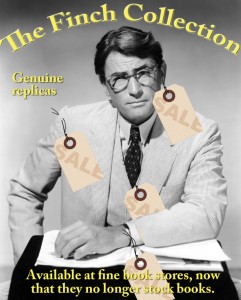Rebranding Literature is a simple plan to make literature more relevant in the marketplace of ideas by maximizing revenue potential.
Over the course of human history, great works of literature have generated less revenue in aggregate than a single day’s worth of Starbucks sales. Why is literature losing out so badly to the coffee mongers? That they sell a drug, legally, we rejected as too simplistic; many retailers of drugs legal and illegal don’t get wealthy. We attempted to answer this question by visiting a local Starbucks. The answer is shockingly obvious if you have eyes to see. Just look around. Everything is for sale. Little racks with branded items pop up like toadstools. Nature abhors a vacuum; so does Starbucks—every empty space is filled with something you could buy. So, we have initiated a project to go back and apply what we’ve learned to great works of literature in hopes of raising greater revenues.
 Today we look at an American novel that has been winning the hearts of readers for decades, To Kill a Mockingbird, by Harper Lee.
Today we look at an American novel that has been winning the hearts of readers for decades, To Kill a Mockingbird, by Harper Lee.
This Pulitzer Prize-winning novel is an important book in the history of American literature. Further, to many readers the book is a touchstone, a work they connect with at a deep emotional level. Readers have deep affection for the narrator and her family. Readers admire them. And readers remain forever grateful to Harper Lee for authoring it. But think how much more this already very accomplished piece of writing could achieve if it simply looked with enhanced cupidity at potential connections between the art a writer produces and the world of commerce.
We at Stoneslide have fixed this shortcoming of the book.
We think you’ll agree that with the improvements we’ve made to Lee’s text, the story has a much better tone and is literally more valuable. With any luck, future editions will include improvements such as these throughout the novel’s entirety.
To Kill A Mockingbird
by Harper Lee and The Stoneslide Corrective
When he was nearly thirteen, my brother Jem got his arm badly broken at the elbow. When it healed, due to the excellent treatment at Monroe County Hospital and Outpatient Clinic—“Care for Our Community”—and after Jem’s fears of never being able to play football, in Tuscaloosa—Roll Tide!—or, for that matter, in Auburn—War Eagle, Atticus!—were assuaged, he was seldom self-conscious about his injury. Atticus credits this to the great counseling Jem received from the psychologist he—Atticus—located through Theravive. Their motto is, “Our hearts: to help you find your new path.” They sure did do right by Jem. Jem’s left arm was somewhat shorter than his right; when he stood or walked, the back of his hand was at right angles to his body, his thumb parallel to his thigh. He couldn’t have cared less, so long as he could pass and punt. Jem wanted to take his shot in the next Punt, Pass, and Kick competition.
More Literature, Rebranded:
–Keats, Lawrence, Hopkins
–Faulkner, Hemingway
–Salinger, Williams


